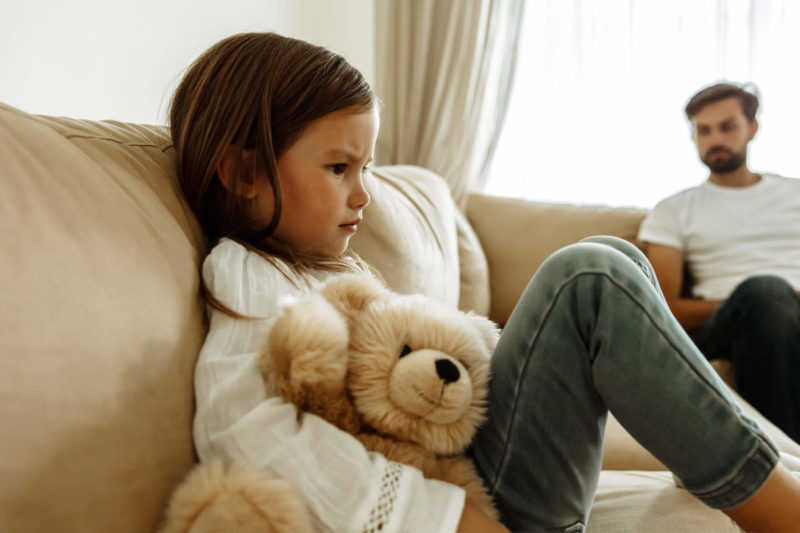
by Mary Romm, Licensed Professional Counselor in Glouchester, VA
Your Child Experienced a Trauma — How TF-CBT Can Help
You are worried about your child. They’ve experienced something physically or emotionally that caused them distress, and it continues to affect them. If your child has experienced trauma, Trauma-Focused Cognitive Behavioral Therapy (TF-CBT) can help.
How Can I Notice Trauma in My Child?
You may notice your child has begun having nightmares, avoiding certain people or places, having trouble in school, or exhibiting aggression or an argumentative default posture. You may notice your child is randomly angry about little things, seeming to have intense mood swings where they are up and down at the drop of a hat, or in denial about what occurred. Your child may be struggling in their relationships, experiencing anxiety or depression, or so much more.
What Is Trauma for Children?
Scarily enough for a parent, trauma can be anything that makes your child feel helpless, unable to cope with the situation, and worse, unable to feel. The most common types of trauma for kids are divorce, physical abuse, sexual abuse, witnessing domestic violence, a parent or relative in jail, substance abuse, and more.
What Exactly Is TF-CBT?
Good news — Trauma-Focused Cognitive Behavioral Therapy is a research-based approach of 25 years that has been proven helpful for children and adolescents.
TF-CBT is a cognitive behavioral treatment, meaning that it works with your child on the harmful thoughts and behaviors they may have about what happened. Here’s how it works.
What Can We Expect from the Beginning of TF-CBT?
In TF-CBT, the therapist will start with an assessment to determine if your child has PTSD. This will help you understand what is going on with your child and their trauma responses. The therapist will then begin to work with your child, starting with psychoeducation about what happened. The psychoeducation phase is great for reducing the blame your child may feel, giving your child words for what happened to them, and enabling them to ask their own questions.
How Does TF-CBT Address My Child Learning to Manage Their Emotions?
You are probably wondering, “Okay, words and knowledge are great — but what about these symptoms?!” Next, the therapist will work with your child on coping skills. Your child will learn how to relax their body, deep breathe, and handle stressful situations. These are great skills for children and adults alike and can lay a foundation for your child’s future successful weathering of difficult situations in life. Children then begin to work on naming feelings, working towards talking about feelings from the event. They’ll also start the work of understanding their feelings and emotions and bringing those up to the surface. This can be great for children who have trouble expressing their feelings or who seem angry all the time and lack the words for why they are angry or the skill of looking at deeper feelings beneath the anger.
How Does TF-CBT Finally Address the Trauma?
Once the foundation is sufficient for the child to control their emotions, name their feelings, and work through their thoughts, the child will write a trauma narrative and eventually share it with the parent. The therapist works with the parent to prepare them for this moment. This sharing and healing of the trauma can be incredibly therapeutic and helpful when done right.
Well, How Am I As the Parent Involved in the Therapy?
As the parent, you’ll start with joint sessions with your child. Then you’ll have some sessions on your own, where you’ll get to talk about the event and how it impacted you, learn new parenting techniques and how to better support your child, and work toward better communication with your child.
You may find it helpful to pursue your own healing journey through therapy independent from your child’s TF-CBT. To start searching for a therapist, start with a geographic search in your area, and then narrow down your choices with our filters. A great place to start is with Common Specialities, and we have ton of them (most live under All other issues).
How Many Sessions Does TF-CBT Take?
TF-CBT generally takes from 8-25 sessions and can occur anywhere, such as an outpatient facility, school, residential placement, etc.
Is TF-CBT Effective?
TF-CBT is effective. Gains have been found to last 2 years post-treatment. TF-CBT has also been shown to reduce symptoms of both the child AND the parent. How’s that for a double whammy?
How Do I Find a TF-CBT Therapist for My Child?
Start by searching GoodTherapy in your area. Add two filters to your results: Under Age of Client(s), tick the Children or Teen box, as appropriate. Under Type of Therapy, scroll all the way down to tick Trauma-Focused Cognitive Behavioral Therapy.
Mary Willoughby Romm is a licensed professional counselor who offers online therapy for the state of Virginia. She is certified in both Trauma-Focused Cognitive Behavioral Therapy and Parent-Child Interaction Therapy, an excellent therapy option for children ages 2 to 7. She enjoys working with children two years old and up, tweens, teens, college students, and women. You can find her at Willow Tree Healing Center.
© Copyright 2021 GoodTherapy.org. All rights reserved. Permission to publish granted by Mary Romm, Licensed Professional Counselor in Gloucester, VA

